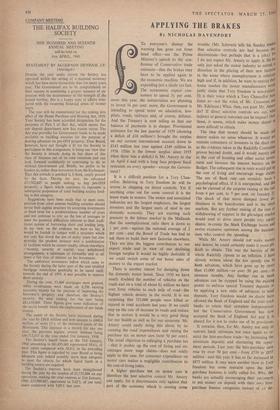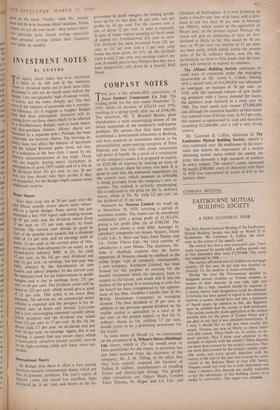APPLYING THE BRAKES
By NICHOLAS DAVENPORT To everyone's dismay the warning has gone out from head office—see the Prime Minister's speech to the con- ference of Conservative trade unionists—that the brakes may have to be applied again to the economic machine. We are expanding just a shade too fast. The economists expect con- sumers to spend 3+ per cent. more this year, the industrialists are planning to invest 16 per cent. more, the Government is intending to spend more on education, hos- pitals, roads, railways and, of course, defence. And the Treasury is now telling us that our balance of payments is in danger. Provisional estimates for the last quarter of 1959 (showing a deficit of £18 million!) brought the surplus on our current international account down to £145 million last year against £349 million in 1958. (This is the lowest surplus since 1955 when there was a deficit.) Is Mr. Amory to rise on April 4 and with'a long face propose fiscal restraints on every spender—except the Govern- ment?
It is a difficult position for a Tory Chan- cellor. Believing in Tory freedom he will be averse to clapping on direct controls. Yet if anything cries out for some control it is the home trade in motors. The motor and associated industries are the largest employers, the largest investors and the largest users of steel in our domestic economy. They are exerting such pressure in the labour market in the Midlands that the unemployment ratio there is down to 1 per cent.—against the national average of 2 per cent.—and the Board of Trade has had to ask them to build their new factories elsewhere. They are also the biggest contributors to our export trade and in view of our declining foreign surplus it would be highly desirable if we could switch some of our home sales of motors to the export market.
There is another reason for damping down the domestic motor boom. Since 1950 we have nearly doubled the number of vehicles on the roads and on a total of about 8+ million we have over forty vehicles to each mile of road—the highest vehicle density in the world. It is not surprising that 333,000 people were killed or injured in road accidents last year. If we could step up the rate of increase in roads and reduce that in motors it would be a very good thing for our health as well as for our economy. Mr.
Amory could easily bring this about by in- creasing the road expenditures and raising the purchase tax on motor cars (now 50 per cent.).
The usual objection to enlarging a purchase tax —that it pushes up the cost of living and en- courages more wage claims—does not really apply in this case, for consumer expenditure on motor cars makes a negligible contribution to the cost-of-living index.
A higher purchase tax on motor cars is therefore the best selective control Mr. Amory can apply, for it discriminates only against that part of the economy which is causing some
trouble. (Mr. Schwartz tells his Sunday readers that selective controls are bad because their discriminate—but perhaps that is a joke.) Yet I do not expect Mr. Amory to apply it. He.liss only just asked the motor industry to submit.° direction in the placing of their new factories in the areas where unemployment is relativelY high and if, in addition, he were to restrict the home market the motor manufacturers would justly claim that Tory freedom is non-existent. (It is their voice which a Tory Chancellor must listen to—not the voice of Mr. Crossrnan and Mr. Edelman.) What, then, can poor Mr. AntorY do? If direct selective controls are out. wl°1 indirect or general restraints can he impose? OnlY those, it seems, which make money dearer of more difficult to obtain. The idea that money should be made still dearer makes no sense whatever. It would riot restrain consumers or investors in the short run, as the evidence taken at the Radcliffe Committee proves beyond doubt, and it would merely add to the cost of housing and other social invest' ment and increase the interest burden on the Budget. The subsequent rise in rents would put al) the cost of living and encourage wage claims. The use of Bank rate can certainly have $ psychological effect, if it is unexpected, and this can be claimed of the surprise raising of the rate from 4 per cent. to 5 per cent. on January 21. The shock of that move damped down eil" thusiasm in the boardrooms and in the stoelc markets. But any further raising of the rate Of withdrawing of support in the gilt-edged market would tend to drive more people into equitY shares, re-create the Stock Exchange boom and revive excessive optimism among the business' men who control the spending.
While Mr. Amory should not make moneY any dearer, he could certainly make it more dif" ficult to obtain. This was the burden of the whole Radcliffe riposte to an inflation. I have already written about the too speedy rise 10 bank advances, which have gone up by more than £1,000 million—or over 50 per cent.—i0 nineteen months. Any further rise in bank advances can be stopped by using the existing power to enforce special Treasury deposits or by applying a new ratio of advances to total deposits. Tory freedom would no doubt have allowed the Bank of England and the joint stock banks to retain their complete independence, but the Conservative Government has noW accepted the Bank of England Act and it is absurd for it not to make use of its provisions.
It remains, then, for Mr. Amory not only to restrain bank advances but once again to re- strict the hire-purchase trade—by increasing the minimum deposits and shortening the repaY- ment periods. Last year the hire-purchase debt rose by over 50 per cent.---from £559 to £857 million—and this year it has so far increased to £873 million. It may seem another blow to Tory freedom but some restraint upon the hire- purchase business is really called for. Why, the banks are actually encouraging their customers to put money on deposit with their own hire- purchase finance companies instead of on de- Posit at the bank. Finally, what Mr. Amory Must not do is to increase direct taxation. Tories believe we are all over-taxed : they cannot there- fore advocate more forced saving—especially
personal savings (under their freedom) have gone up steadily.



















































 Previous page
Previous page